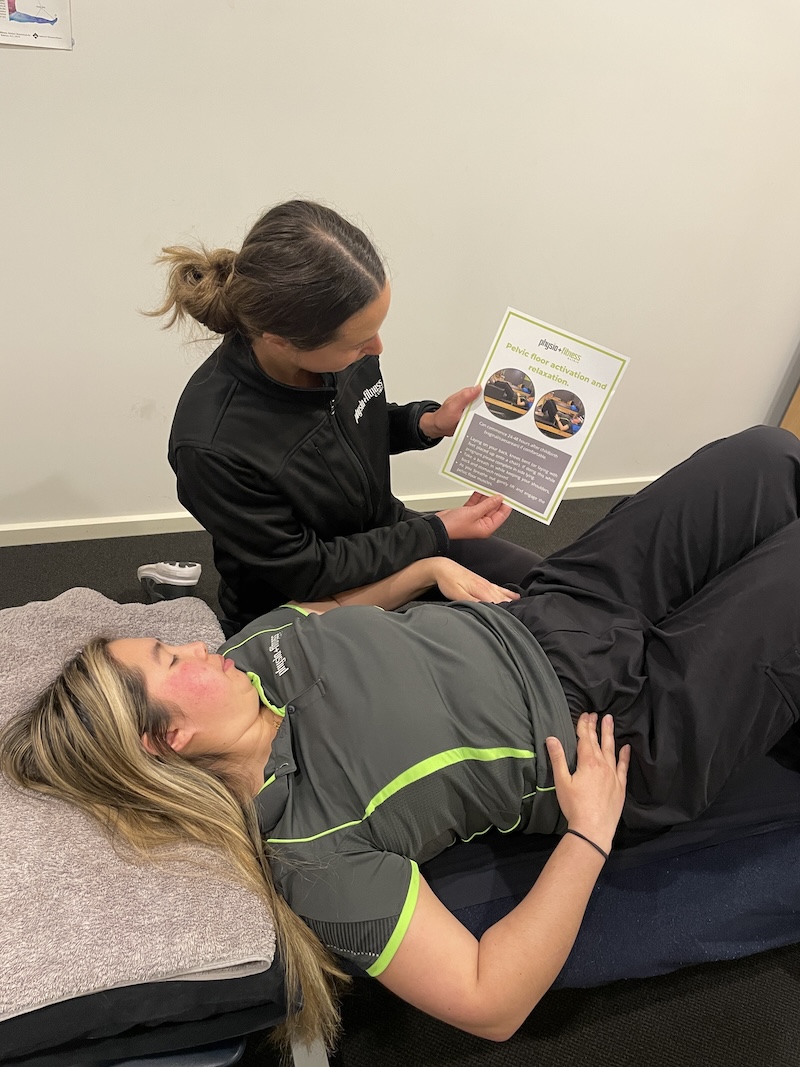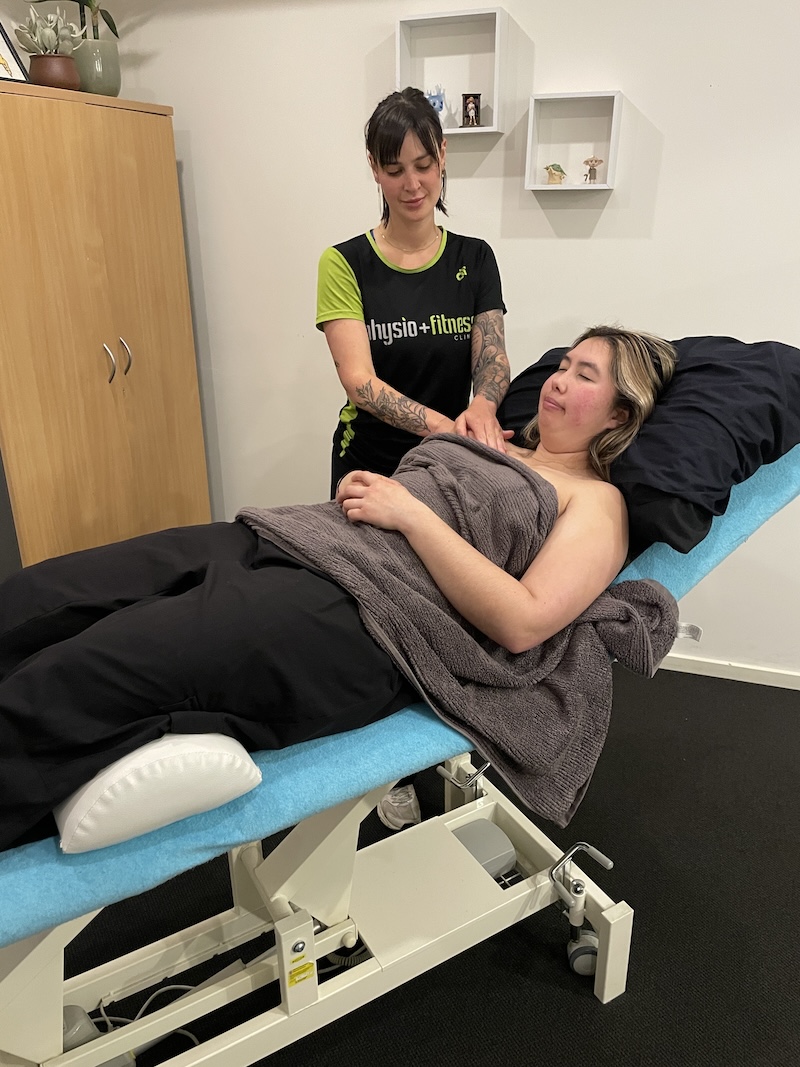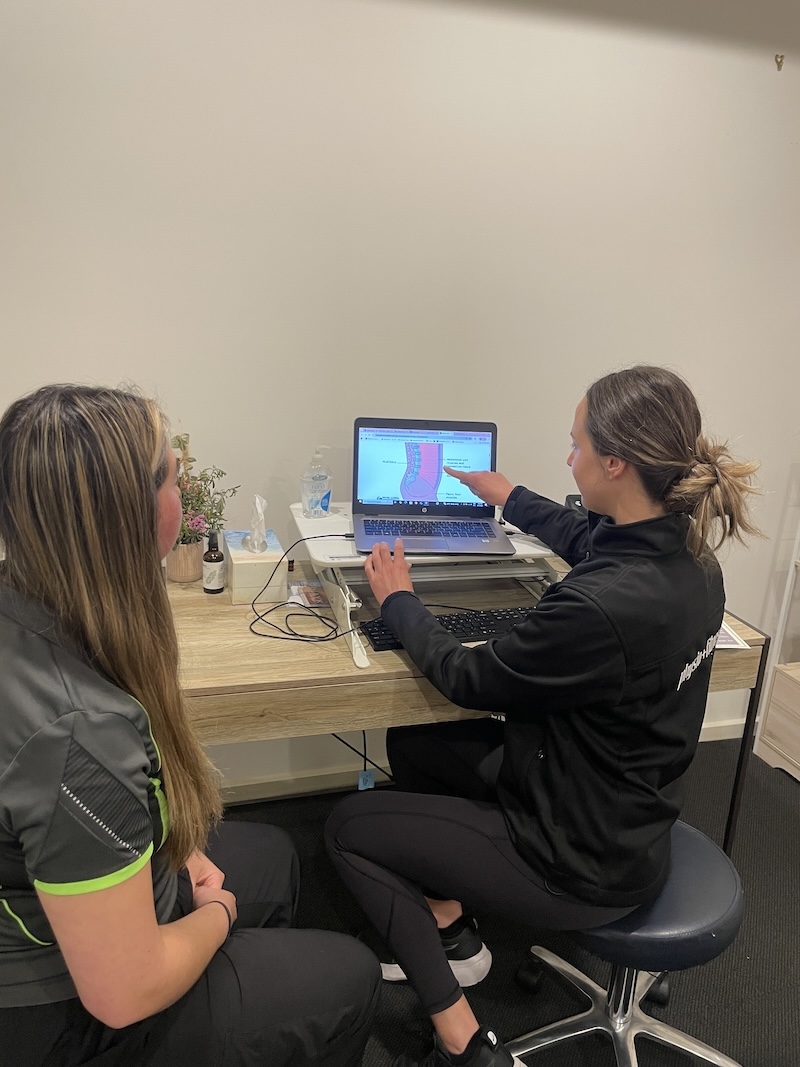Pilates, Physiotherapy & Myotherapy During Pregnancy
Here at the Physio and Fitness Clinic we treat women throughout all phases of their pregnancy journey. We understand that during this time, our bodies go through many changes and therefore we offer support, education and pain management for all those entering motherhood.
Our physiotherapist/clinical pilates practitioner Kirra-lee, and our Myotherapist Alli, have a special interest and extra training in Women’s health.

Pilates, Physiotherapy & Myotherapy During Pregnancy
Here at the Physio and Fitness Clinic we treat women throughout all phases of their pregnancy journey. We understand that during this time, our bodies go through many changes and therefore we offer support, education and pain management for all those entering motherhood.
Our physiotherapist/clinical pilates practitioner Kirra-lee, and our Myotherapist Alli, have a special interest and extra training in Women’s health.
Pelvic floor & Pregnancy
Common symptoms of pelvic floor issues:
- Urinary (incontinence/ frequency/ urgency/ inability to empty bladder)
- Bowel (incontinence/ inability to empty bowel /constipation)
- Pain (around the pelvic region /during intercourse)
- Heaviness (bulging or pressure sensations)
Basic anatomy of the pelvic floor and their function:
- The pelvic floor is a sling of muscles and fascia that sits within the ring that is the pelvic cavity.
- The pelvic floor supports the uterus, bowel and bladder.
- The pelvic floor muscles must maintain a constant level of tone to support our organs but also have the ability to contract and relax to allow us to have full function.
- The pelvic floor also works as an intraabdominal pressure control system along with our diaphragm and core muscles

Pelvic floor & Pregnancy
Common symptoms of pelvic floor issues:
- Urinary (incontinence/ frequency/ urgency/ inability to empty bladder)
- Bowel (incontinence/ inability to empty bowel /constipation)
- Pain (around the pelvic region /during intercourse)
- Heaviness (bulging or pressure sensations)
Basic anatomy of the pelvic floor and their function:
- The pelvic floor is a sling of muscles and fascia that sits within the ring that is the pelvic cavity.
- The pelvic floor supports the uterus, bowel and bladder.
- The pelvic floor muscles must maintain a constant level of tone to support our organs but also have the ability to contract and relax to allow us to have full function.
- The pelvic floor also works as an intraabdominal pressure control system along with our diaphragm and core muscles
How Women’s Health Physiotherapy/Myotherapy/Pilates can help
1. Education on the Current exercise guidelines during pregnancy to ensure safe, healthy and fit pregnancy. Alongside, safely returning to exercise after having a baby.
2. Pregnancy massage for pain management and relaxation. We have pregnancy pillows to ensure your comfort.
3. Exercises to strengthen the core and pelvic floor muscles to complete during group sessions or as a specialised home exercise program to carry out independently.
3. Assisting in the management of common pre and post natal conditions such as lower back pain, pelvic girdle pain, carpal tunnel syndrome, neck pain and abdominal separation.
4. Pelvic floor exercises to assist with incontinence, pelvic organ prolapse and pain.
When we refer on:
We have a strong referral network should you require additional care. We do not do internal examination of the pelvic floor muscles, therefore, if this is a service you require we are happy to provide you with a great referral.

How Women’s Health Physiotherapy/Myotherapy/Pilates can help
1. Education on the Current exercise guidelines during pregnancy to ensure safe, healthy and fit pregnancy. Alongside, safely returning to exercise after having a baby.
2. Pregnancy massage for pain management and relaxation. We have pregnancy pillows to ensure your comfort.
3. Exercises to strengthen the core and pelvic floor muscles to complete during group sessions or as a specialised home exercise program to carry out independently.
3. Assisting in the management of common pre and post natal conditions such as lower back pain, pelvic girdle pain, carpal tunnel syndrome, neck pain and abdominal separation.
4. Pelvic floor exercises to assist with incontinence, pelvic organ prolapse and pain.
When we refer on:
We have a strong referral network should you require additional care. We do not do internal examination of the pelvic floor muscles, therefore, if this is a service you require we are happy to provide you with a great referral.
PREGNANCY PHYSIO FAQs
Q. Do I have to be pregnant to see Kirra or Ali
A.
Absolutely not! Although a lot of pelvic health issues can occur pre/post partum, this is not always the case. If you have any of the following symptoms or concerns seen above, both the girls would be appropriate to see!
Q. Why is my back pain so much worse during pregnancy?
A.
During pregnancy, your body releases hormones that promote joint and ligament laxity. This laxity is vital for you to be able to give birth! It does however, potentially cause more pain within joints, especially, within the lower back, as with more laxity of passive structures, comes more demand of the active structures to support your joints.
Furthermore, you have a little child living in your belly, ha! This forward load forces increased curves within your lumbar spine. The body hates unopposed postures, and unfortunately, it is much harder to oppose your lower back posture when you are pregnant!
Q. Will my pelvic floor weakness resolve on its own?
A.
Sometimes! Although for some, some more tailored rehab is needed to be able to re engage and control your pelvic floor. When in doubt, get some professional advice and help!
Q. Can you treat me if I am heavily pregnant? I cannot lie on my stomach!
A.
Yes – you can be safely treated in either a side lying position, or on your stomach. We have the appropriate equipment and pillows that allows you to feel comfortable and safe in any position of treatment you prefer.
Q. Is exercise important during pregnancy?
A.
Absolutely. As mentioned, when pregnant, your body’s joints become more mobile. It is vital to have the necessary strength to compensate for this laxity of passive structure, to keep supporting the joints.
Maintaining strength throughout pregnancy will absolutely help reduce your risk of pain!
